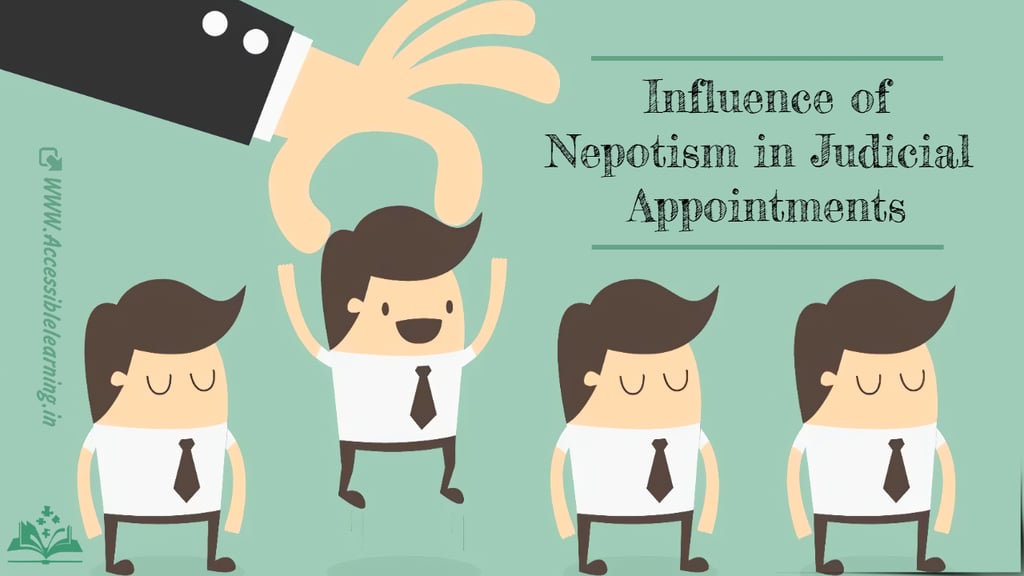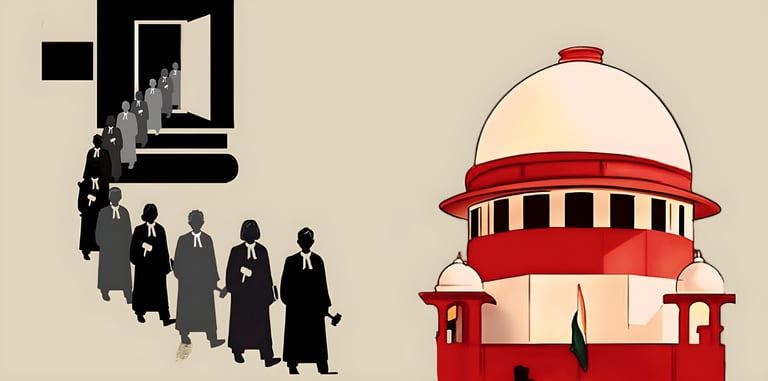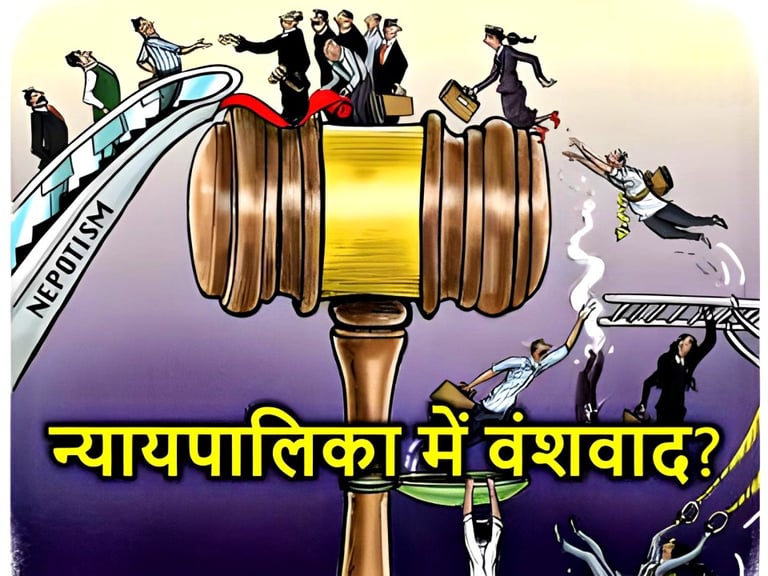
Nepotism and Favoritism in the Judiciary: A Threat to Justice?
"Explore the pervasive challenges of nepotism and favoritism in the judiciary, focusing on their impact on judicial independence, transparency, and public trust. This in-depth analysis highlights systemic issues, the role of the collegium system, and potential reforms for a merit-based judiciary.
INDIAN HISTORYJUDICIARYPOLITICAL JOURNEYAWARE/VIGILANTNEPOTISM/SOCIAL ISSUES
Keshav Jha
1/8/20257 min read


The judiciary, as the cornerstone of democracy and the rule of law, is entrusted with safeguarding justice and upholding constitutional values. However, allegations of nepotism and favoritism have increasingly cast shadows over this sacred institution, raising concerns about the impartiality and transparency of judicial appointments and functioning. This article delves deep into the dynamics of nepotism and favoritism within the judiciary, with a particular focus on the controversial role of the collegium system in India.
Understanding Nepotism and Favoritism in the Judiciary
Nepotism, the practice of favoring relatives or close acquaintances in appointments and promotions, and favoritism, the biased preference for certain individuals over others, have been widely criticized in various sectors. When these practices infiltrate the judiciary, they erode public confidence in the judicial system’s ability to deliver fair and unbiased justice.
In the judiciary, these practices manifest primarily during the selection and elevation of judges. Allegations often point to senior judges recommending or favoring their close relatives, friends, or protégés for prominent judicial positions. Such allegations, even if unsubstantiated, tarnish the reputation of the judiciary and undermine its legitimacy.
The Role of the Collegium System
India’s judiciary operates under the collegium system for appointing and transferring judges to higher courts, including the Supreme Court. This system comprises the Chief Justice of India and a group of senior judges who collectively decide appointments. While the collegium system was intended to ensure judicial independence by keeping political interference at bay, it has faced severe criticism for its opaque and non-accountable decision-making process.
Concerns Raised Against the Collegium System
Lack of Transparency: Decisions regarding judicial appointments are made behind closed doors with little or no explanation provided for the selection or rejection of candidates. This lack of transparency fuels suspicions of nepotism and favoritism.
Concentration of Power: The collegium system centralized significant power in the hands of a few senior judges, increasing the potential for subjective biases and personal preferences to influence decisions.
Family Connections: There have been instances where close relatives of sitting or retired judges have been elevated to judicial positions, raising questions about meritocracy. Critics argue that such patterns indicate a systemic bias favoring familial ties over qualifications and competence.
Accountability Deficit: The collegium’s decisions are not subject to scrutiny by any external body, making it difficult to hold decision-makers accountable for perceived biases or unfair practices.
Impact of Nepotism and Favoritism on the Judiciary
Erosion of Public Trust: Public confidence in the judiciary is paramount. Allegations of favoritism and nepotism, whether proven or not, create perceptions of bias and partiality, leading to a loss of trust in the institution.
Compromised Quality of Justice: When appointments are influenced by connections rather than merit, the judiciary risks compromising on the quality and competence of judges. This, in turn, affects the delivery of justice.
Demoralization of Talented Candidates: Aspiring legal professionals who are sidelined due to nepotistic practices may become disillusioned, leading to a brain drain in the legal field.
Weakening of Judicial Independence: Nepotism and favoritism can create a network of patronage within the judiciary, making it vulnerable to external influences and reducing its independence.
Reduced Public Perception of Fairness: The judiciary is expected to be an impartial arbiter of justice. Persistent allegations of nepotism can diminish its image as a neutral and equitable institution, thereby affecting public perceptions of fairness in legal processes.


Historical Context and Prominent Allegations
The issue of favoritism in judicial appointments is not new and has historical roots in many countries. In India, several high-profile instances have brought this issue to the forefront. For example:
Allegations of "Judicial Dynasties": Certain families have seen successive generations occupying prominent judicial positions, raising concerns about entrenched nepotism.
Controversial Recommendations: Cases where the collegium has recommended individuals with perceived conflicts of interest have sparked debates about the merit and integrity of such decisions.
Whistleblower Judges: On rare occasions, retired or serving judges have publicly criticized the collegium system and highlighted instances of favoritism, lending credibility to concerns raised by the public and legal fraternity.
Global Perspectives on Judicial Appointments
United States: The federal judiciary in the U.S. relies on presidential nominations and Senate confirmations. While this process is transparent, it is often criticized for being politically influenced.
United Kingdom: Judicial appointments in the U.K. are overseen by the Judicial Appointments Commission, an independent body aimed at ensuring merit-based selections. However, even this system has faced occasional allegations of favoritism.
European Union: Many European countries use independent commissions to appoint judges. While these systems aim to reduce bias, they are not immune to claims of nepotism.
Japan: Japan’s judiciary involves internal promotions, which some argue lack transparency, giving rise to concerns about favoritism within the judicial hierarchy.


Cultural and Systemic Roots of Nepotism and Favoritism
The roots of nepotism in the judiciary often lie in broader socio-political and cultural systems where familial ties and personal relationships are valued over institutional integrity. In societies where lineage and social connections play a significant role, these practices can pervade even the most independent institutions, including the judiciary.
Informal Networks of Influence
Informal networks often dominate the legal profession, with senior lawyers or judges mentoring younger members of their families or close acquaintances. This mentorship, while beneficial in some cases, can tilt the scales of fairness during judicial appointments.
The lack of structured career paths for judges in some countries amplifies reliance on informal recommendations and personal lobbying.
Judicial Legacy
The concept of "judicial dynasties" is prevalent in several jurisdictions. While generational continuity in any profession isn't inherently problematic, it raises eyebrows when merit is overshadowed by familial ties.
Technology and Data in Enhancing Transparency
The advent of technology offers promising tools to mitigate favoritism and nepotism. Some innovative measures could include:
Digital Merit-Based Ranking Systems
Implementing AI-driven systems to evaluate candidates based on pre-defined criteria such as experience, case outcomes, and professional conduct can minimize human biases.
Online Publication of Vacancies and Selection Criteria
Making judicial vacancies and the selection process accessible online with a transparent application and review mechanism can discourage favoritism.
Whistleblower Portals
Confidential digital platforms where individuals can report instances of favoritism or unethical practices within the judiciary.
Case Studies Highlighting Issues and Reforms
Case Study 1: Collegium Controversies in India
The Indian collegium system has faced severe backlash for alleged favoritism. For instance, critics often point to instances where certain names were repeatedly recommended despite questions about their qualifications. These controversies have led to calls for judicial accountability and reform.
Case Study 2: Judicial Reform in South Africa
South Africa's post-apartheid judicial system aimed to address biases and favoritism through the Judicial Service Commission (JSC). The JSC brought in a structured interview process and promoted transparency, but occasional allegations of bias and political interference persist.
Case Study 3: The UK Judicial Appointments Model
The UK Judicial Appointments Commission (JAC) employs a merit-based, structured approach with panel interviews and assessments to minimize favoritism. While this has increased transparency, occasional critiques of underrepresentation and bias still emerge.


Public Perception and Its Consequences!
Public perception plays a critical role in determining the judiciary’s legitimacy. Surveys in various countries have shown a steady decline in trust when nepotism allegations surface. For example:
India: Public trust in the judiciary has fluctuated due to opaque practices in the collegium system.
United States: Partisan appointments often polarize public opinion, with conservatives and liberals questioning the impartiality of judges aligned with opposing ideologies.
Europe: Despite stringent appointment mechanisms, elite domination in some countries leads to skepticism about inclusivity and fairness.
The Role of Media and Civil Society
Civil society organizations and investigative journalism play a pivotal role in exposing judicial favoritism. However, they often face challenges such as:
Access to Information: The lack of transparency in judicial appointments makes it difficult to substantiate claims of nepotism.
Intimidation and Backlash: Whistleblowers and journalists exposing judicial misconduct are sometimes subjected to harassment or legal action.
International Examples of Best Practices
Germany: Judicial appointments are made by committees comprising judges, legal experts, and politicians, ensuring diverse input and accountability.
Canada: The Canadian Judicial Council reviews the professional and ethical conduct of judges, ensuring oversight and public accountability.
Scandinavian Countries: These nations often use a combination of independent commissions and public hearings to maintain transparency and public trust.
Ethical Dimensions and Long-Term Solutions
Beyond structural reforms, addressing favoritism requires a shift in institutional culture and values. Ethical training for judges and legal professionals can help inculcate a sense of duty and fairness. Long-term measures could include:
Public Ethics Commissions: Independent bodies to review judicial conduct and recommend disciplinary actions.
Periodic Surveys: Public feedback mechanisms to assess the judiciary’s performance and trust levels.


Addressing the Issue: The Way Forward
To restore public faith in the judiciary and ensure a fair appointment process, the following measures could be considered:
Reforming the Collegium System: Introducing greater transparency in the collegium’s functioning, such as publishing the reasons behind appointments and rejections, can reduce suspicions of favoritism.
Establishing an Independent Oversight Body: Creating a judicial appointments commission with representation from the judiciary, executive, and civil society can enhance accountability and ensure merit-based selections.
Implementing Meritocratic Criteria: Clearly defined and publicly accessible criteria for judicial appointments can help ensure that selections are based on qualifications, experience, and integrity.
Strengthening Accountability Mechanisms: Periodic audits of judicial appointments and performance evaluations of judges can help identify and address instances of nepotism and favoritism.
Promoting Diversity: Encouraging diversity in judicial appointments can ensure a broader representation of society and reduce the concentration of power within certain groups.
Legal Framework for Transparency: Enacting legislation to mandate the disclosure of criteria and processes followed in judicial appointments can ensure that decisions are made transparently and are subject to public scrutiny.
Encouraging Whistleblowers: Providing safeguards for judges and legal professionals who expose unethical practices can foster a culture of accountability and deter favoritism.
Nepotism and favoritism are antithetical to the principles of justice, fairness, and equality that the judiciary stands for. Addressing these challenges requires a concerted effort to reform the appointment process, ensure transparency, and hold decision-makers accountable. By prioritizing merit and integrity over personal connections, the judiciary can reaffirm its commitment to the rule of law and restore public trust in its impartiality and independence. Only then can it truly serve as the guardian of justice in a democratic society.
Subscribe To Our Newsletter
All © Copyright reserved by Accessible-Learning Hub
| Terms & Conditions
Knowledge is power. Learn with Us. 📚


